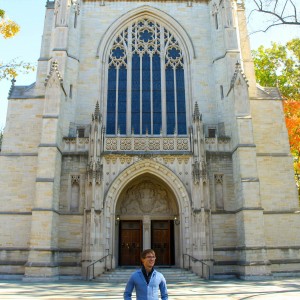
It’s late at night in the lab during my spring abroad in England. We’re waiting for the microplate reader to spit out another noisy mess of data, and I’m struggling. Not with any scientific point, but with trying to articulate poorly-remembered details of St. Thomas Aquinas’ teleology to a Muslim grad student colleague. What, you ask, does biochemistry have to do with Thomist teachings? Well, I wouldn’t be writing this if the answer weren’t “everything.”
Research, you see, isn’t just something we do in the lab or the archives. It’s a powerful expression of that fundamental human desire to understand the way the world works. It’s about wonder: We wonder where we came from, so we study cosmology and biochemistry. We wonder what came before us, so we study paleontology and archaeology. We wonder who we are so we study history, the arts, and the humanities. And we wonder at our place and our role in the world. And scientific answers lead to scientific questions, which inevitably stretch beyond the lab or the library into life.
Back to St. Thomas Aquinas, the great philosopher of a Church neither of us belonged to. Of his five ways of proving the existence of God, the fifth, teleological argument is that non-sentient things, like cells and the molecules within them, seem to move with a purpose, so something or some One (taken to be God) must be imparting that purpose to them. The molecules we were working with that night are short chains of amino acids – similar to those which could easily pop up by chance in the disordered primordial soup of ancient earth. Despite their simplicity, these chains assemble into well-ordered structures, which then prompt chemical reactions in the surrounding solution. This may be the first step down the road to complex proteins, the mediators of all the life we see today. And we were carrying out those reactions, a small part of Creation, in the lab that evening. It seemed a wonder Aquinas would never have dreamed of seeing, and one marvelous to behold.
My discussion in Brighton reminded me of a conversation with my thesis adviser, Professor Hecht, about one of his early successes – a protein he and his students designed and evolved in the lab had replaced the function of a natural protein in bacteria. He called that result a “deeply theological moment,” as their creation replaced a small part of capital-C Creation. I’m not particularly religious, but I’m drawn to biochemistry in part because of these “theological moments” and the insight they give us into our deepest past, and our place in this world. But there are far more present implications as well. The term “playing God” is tossed about so much because it seems true: we are in control of phenomena – DNA, nuclear fission, artificial intelligence, human neuroscience – powers over life and death which were inconceivable wonders only a few generations ago. Is it any wonder these technologies have taken society unaware?
He called that result a “deeply theological moment”
It is the responsibility of researchers not only to seek the truth, but to seek a moral truth – thinking carefully about our research into nature and human nature, and considering its philosophical and practical implications. Consider perhaps the most famous scientist of the 20th century, Albert Einstein, who is remembered for his famous equation E=MC2, but honored for his tireless work to ensure that the nuclear power unleashed by that equation would not be used for ill. Knowledge is power, and with great power comes great responsibility. We cannot hope for research to advance the knowledge of humanity without allowing it to show us truths about ourselves – our habits, our fears, our precarious place on this planet or in this universe. And when, inevitably, the answers we find challenge our fundamental assumptions about how the world works, we have a responsibility as researchers to give up our assumptions for the truth, and the new questions it poses.
Embrace those truths. Marvel at them. Even as an undergraduate, your research explores some small part of our past, our humanity, our destiny. Live your research.
– Bennett McIntosh, Natural Sciences Correspondent

